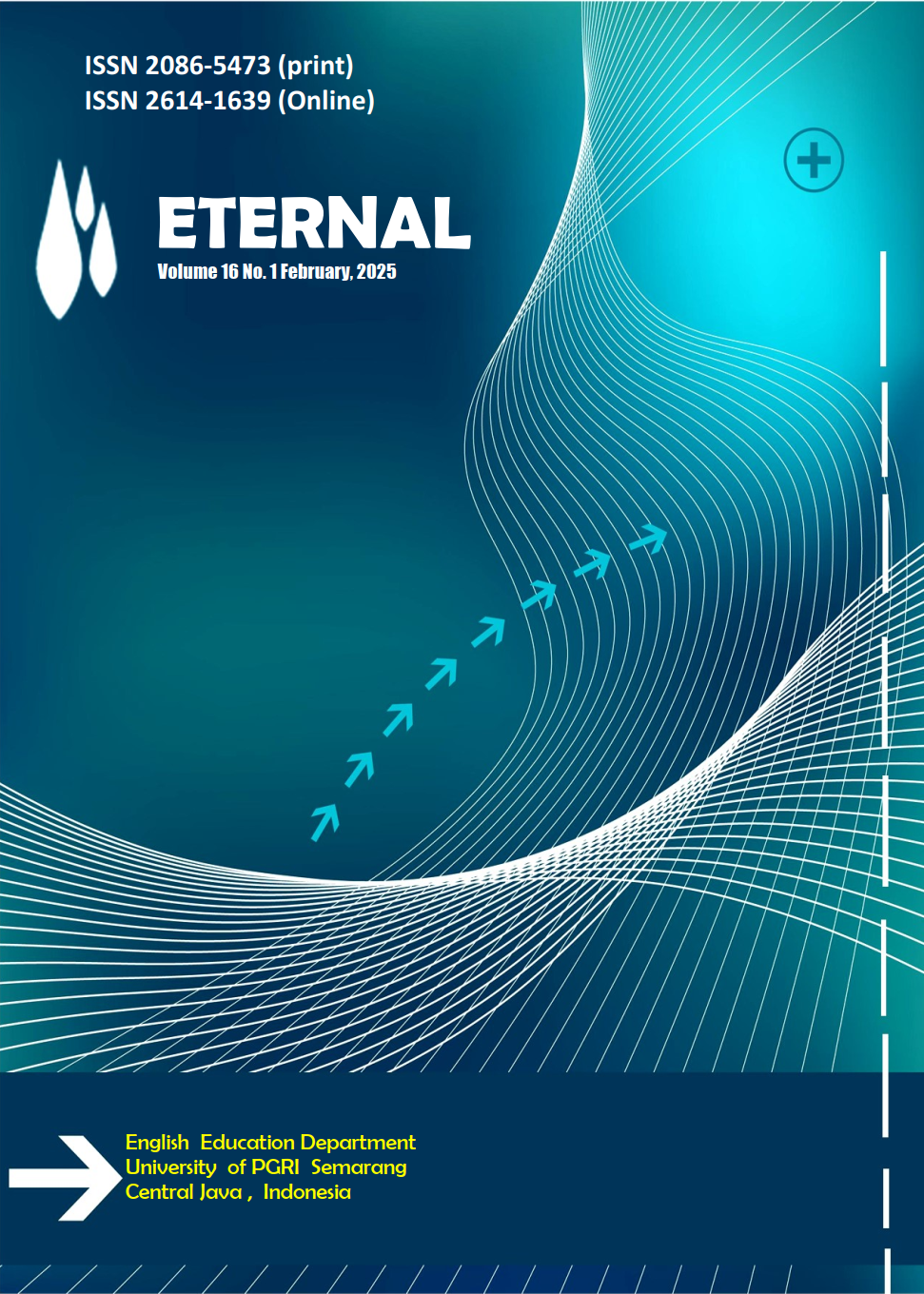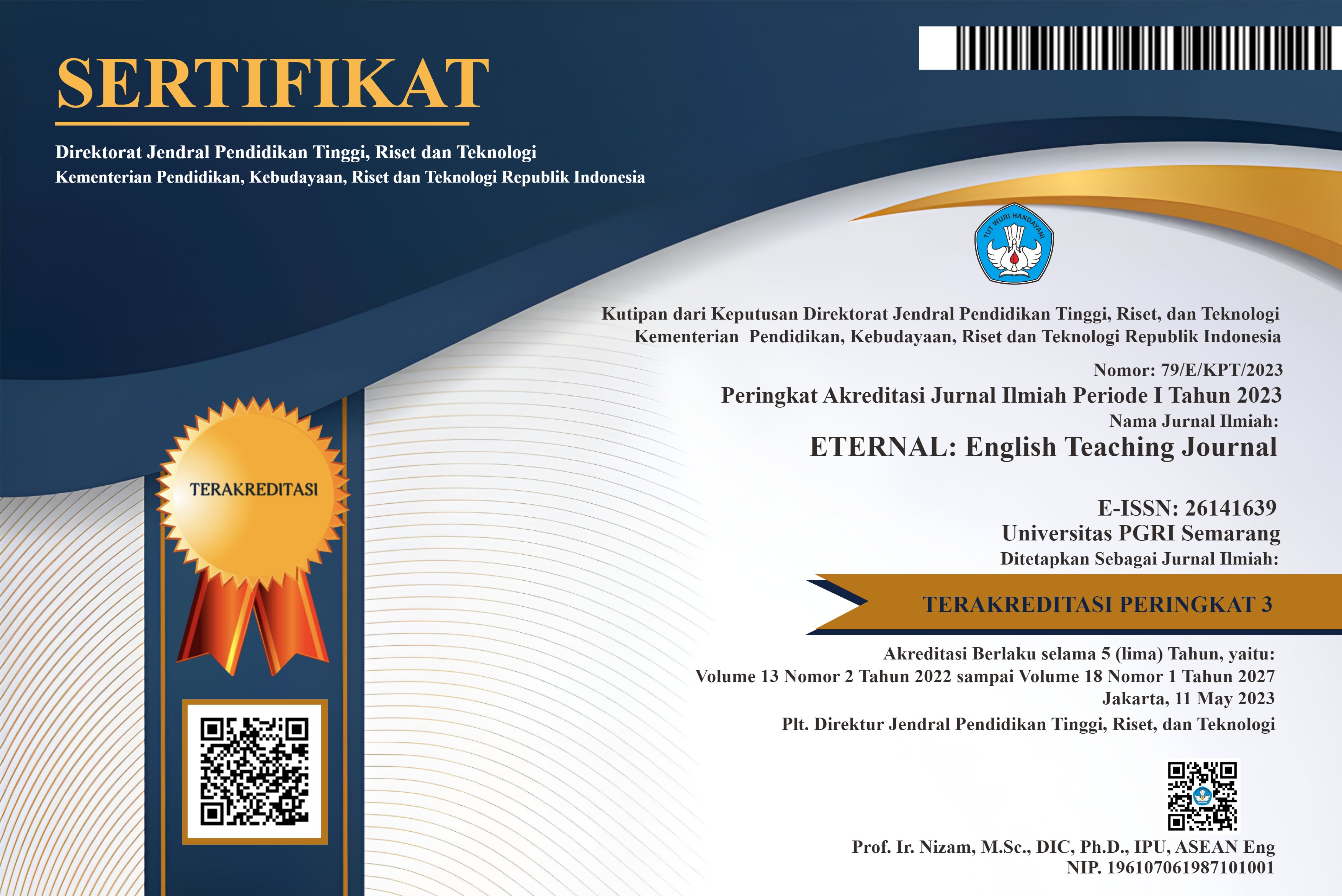EFL Students’ Perception towards the Use of Debate Video Session for Vocabulary Acquisition and Retention
DOI:
https://doi.org/10.26877/eternal.v16i2.2056Keywords:
Debate, English Foreign Language, Video, Vocabulary acquisitionAbstract
Discovering captioned debate videos for vocabulary acquisition is an essential learning strategy for EFL learners. Vocabulary is a crucial element in the acquisition of a foreign language. However, many students experience challenges in mastering English vocabulary. Various vocabulary learning strategies were established, with some students utilizing personalized techniques to learn new words. Learners' motivation and obsession with vocabulary acquisition are enhanced by audiovisual stimuli, such as animated films, videos, and music, which captivate their attention. This study aims to explore students' perceptions of using captioned debate video sessions in English for vocabulary acquisition and retention. In this study, the researcher utilized a mixed method. The research was conducted in the English Department of Universitas Negeri Malang, East Java. It involved 40 participants: 30 undergraduate students in their third and fifth semesters and 10 postgraduate students in their first semester of master's studies. The findings revealed that debate videos improved EFL learners' English vocabulary mastery and pronunciation and helped with word retention. Captioned debate videos should be employed in the EFL teaching classroom to enhance learners' English proficiency, particularly for vocabulary acquisition and retention, as well as to foster pronunciation. In addition, captioned debate videos can improve active vocabulary mastery and listening comprehension.
References
Aam, Ali, Rahman., Anggi, Angraeni. (2020). 1. Empowering Learners with Role-Playing Game for Vocabulary Mastery. International Journal of Learning, Teaching and Educational Research, doi: 10.26803/IJLTER.19.1.4
Andresen, B. B., & Brink, K. V. (2013). Multimedia in education. Moscow: UNESCO Institute for Information Technologies in Education. –2013.–141р.https://iite.unesco.org/pics/publications/en/files/3214723.pdf.
Beta, Fadiatun, Nisa., Luk-Luk, Nur, Mufidah. (2023). Teknik Pembelajaran Kosa Kata Bahasa Arab Dengan Multimedia. doi: 10.54437/irsyaduna. v3i1.806
Cinganotto, L. (2019). Debate as a teaching strategy for language learning. Lingue e Linguaggi, 30, 107-125, doi: 10.1285/I22390359V30P107
Dalimunthe, L., & Haryadi, R. N. (2022). The Effect of Learning Methods and Vocabulary Mastery on English Speaking Ability. Lingua Educationist: International Journal of Language Education, 1(1), 1–7. https://doi.org/10.54099/le.v1i1.58
Du, K. (2023). Research on the correlation between vocabulary depth knowledge and reading proficiency of English majors. Curriculum and Teaching Methodology. https://doi.org/10.23977/curtm.2023.061609.
Ellen, Taylor-Powell., Marcus, Renner. (2003). 8. Analyzing Qualitative Data.
Fang, He. (2023). Investigating the Effects of Different L2 Caption Types on Young Learners’ Incidental Vocabulary Learning. doi: 10.1145/3606094.3606134
French, S., Ravn, S., Balcaite, E., & Moore, E. (2023). Understanding students’ views on the efficacy of video technology to promote engagement in higher education. Pacific Journal of Technology Enhanced Learning, 5(2), 1-14. https://doi.org/10.24135/pjtel.v1i2.172
Gülseren, Ö. Z., & Araz, S. (2024). Impact of Using Authentic Videos on Foreign Language Vocabulary Learning. RumeliDE Dil ve Edebiyat Araştırmaları Dergisi. https://doi.org/10.29000/rumelide.1455170
Lee, Y. S. (2024). Qualitative and mixed methods. In Translational Orthopedics (pp. 229-232). Academic Press. https://doi.org/10.1016/B978-0-323-85663-8.00010-6
Merriam-Webster. (n.d.). Multimedia. In Merriam-Webster.com dictionary. Retrieved October 20, 2024, from https://www.merriam-webster.com/dictionary/multimedia
Miralpeix, I., Gesa, F., & Suárez, M. del M. (2024). Vocabulary learning from audiovisual input at first exposure in young adult novice learners. Language Learning and Language Teaching, 199–220. https://doi.org/10.1075/lllt.61.09mir
Naeem, Afzal. (2019). A Study on Vocabulary-Learning Problems Encountered by BA English Majors at the University Level of Education. Social Science Research Network, doi: 10.2139/SSRN.3465990
Narzullayevna, S. S., & Jamshidovna, M. F. (2021). The Problems of Learning a Foreign Language: Difficulties with Learning Vocabulary in Second Language Acquisition. Journal of Pedagogical Inventions and Practices, 2, 72-74. https://zienjournals.com/index.php/jpip/article/download/319/232.
Ronald, Carter. (1987). Vocabulary: Applied Linguistic Perspectives. https://www.taylorfrancis.com/books/mono/10.4324/9780203124659/vocabulary-ronald-carter.
Rosales, A. (2019). Vocabulary Acquisition (Incidental) through Watching Subtitled Video Material. ELT Forum: Journal of English Language Teaching, 8(2), 190-197. https://doi.org/10.15294/elt.v8i2.33356
Sabgini, K. N. W., & Wiraatmaja, T. (2023). The usage of video in teaching vocabulary for young learners. Journal of English Educational Study, 6(1), 93–104. https://doi.org/10.31932/jees.v6i1.2309
Sari, F. M. (2019). Enhancing student’s vocabulary mastery through project-based learning in the EFL classroom. In Proceedings of the 2nd International Conference on English Language Teaching and Learning.
Sari, F. M. (2019). Enhancing student’s vocabulary mastery through project-based learning in the EFL classroom. In Proceedings of the 2nd International Conference on English Language Teaching and Learning, p139.
Siyu, Pang. (2024). A Study on Effective Methods of English Vocabulary Learning. Journal of contemporary educational research, doi: 10.26689/jcer. v8i9.8387
Syahid, A., Maulana, A., Zidan, M. R., Julianto, A., Darma, R. N., & Basahil, A. (2024). Penggunaan Media Audiovisual dalam Pembelajaran Kosa Kata Bahasa Inggris pada Siswa SD. LANDMARK: Jurnal Pengabdian kepada Masyarakat, 2(1), 103-110.
Syahid, A., Maulana, A., Zidan, M. R., Julianto, A., Darma, R. N., & Basahil, A. (2024). Penggunaan Media Audiovisual dalam Pembelajaran Kosa Kata Bahasa Inggris pada Siswa SD. 2(1), 103–110. https://doi.org/10.37253/landmark.v2i1.8915
Teng, M. F. (2022). The effectiveness of multimedia input on vocabulary learning and retention. Innovation in Language Learning and Teaching, 17(3), 738–754. https://doi.org/10.1080/17501229.2022.2131791
Thi Dieu Linh, P. (2024) “THE USE OF DEBATE TECHNIQUE TO DEVELOP STUDENTS’ SPEAKING SKILLS”, Journal of Science Educational Science, 69(3), pp. 71–82. doi:10.18173/2354-1075.2024-0048.
Ur, P. (1996). A Course in Language Teaching: Practice and Theory. https://is.muni.cz/publication/35786/cs/A-course-in-language-teaching-practice-and-theory/Ur
Wulandari, A., & Ena, O. T. (2018). Using Debate Activities to Develop Indonesian High School Students' Speaking Skills. Language and Language Teaching Journal, 21(Supplement), 12–20. https://doi.org/10.24071/llt.2018.Suppl2102
Xinrui, Cheng. (2023). Review of English L2 Vocabulary Learning and Teaching: Concepts, Principles, and Pedagogy. English Language Teaching, doi: 10.5539/elt. v16n11p80
Xubo, Yang. (2024). 3. Exploration of Vocabulary Teaching Strategies in Interactive Teaching Mode. Frontiers in science and engineering, doi: 10.54691/rm980e97
Yaska, M., & Nuhu, B. M. (2024). Assessment of Measures of Central Tendency and Dispersion Using Likert-Type Scale. African Journal of Advances in Science and Technology Research, 16(1), 33-45. https://doi.org/10.62154/ajastr.2024.016.010379







